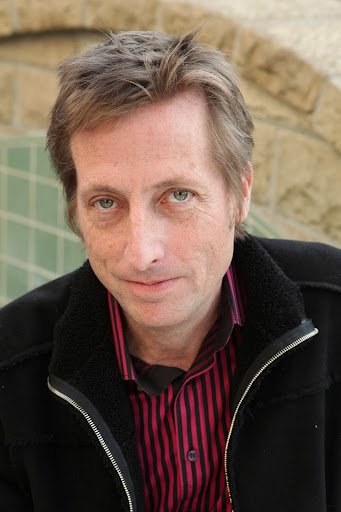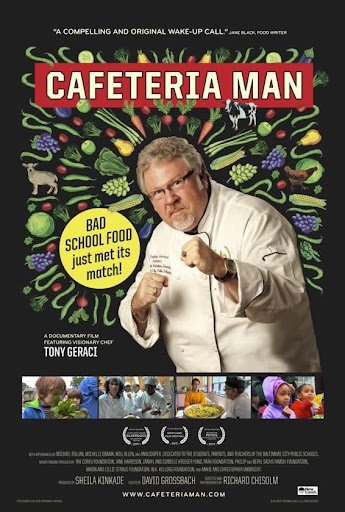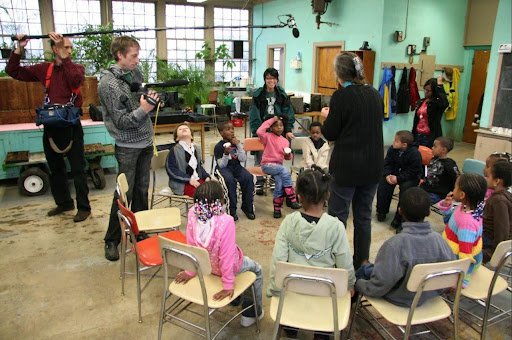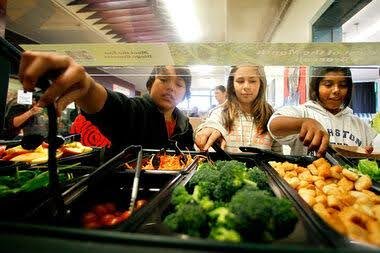By Ziyi Coco, Northwestern Cause Marketing Team
“We just got behind that and kept filming him doing his thing.”
— Richard Chisolm, Director of Cafeteria Man, during the interview with One Earth Film Festival
When filmmaker Richard Chisolm got a phone call from longtime friend and producer Sheila Kinkade, he didn’t expect it to lead to one of his most formative projects. Sheila had read one news about Tony Geraci, a bold new hire arriving in Baltimore to overhaul their city’s deeply flawed school lunch system. Her words: “This sounds like a really good film.”
And it was.
Tony wasn’t a typical public school official—he was a former restaurateur and industry insider turned food justice advocate. “He had a vision,” Chisolm told us. “He just had an incredible tenacity.” Over two years, Chisolm documented Geraci’s radical efforts: meatless Mondays, student-designed meals, vegetable gardens, and even a 33-acre teaching farm. The film follows him as he builds coalitions across schools, churches, and communities, navigating entrenched bureaucracy and corporate pushback. “He got death threats,” Chisolm shared. “From the meat industry, from the dairy industry… and we just kept filming.”
Filming wasn’t easy. Many meetings were closed off; some principals were burned out or hesitant. But Chisolm was determined to go beyond documenting dysfunction.
“We didn’t want to make a film that showed how horrible things are all the time,” he said. “What people need to see is some kind of collaborative effort to solve the problem—some kind of sense of hope.”
That hope shines brightest through Alice, a 12-year-old student who didn’t just speak up—she made history. With Tony’s and Cafeteria Man Team’s support, she became the youngest American citizen ever to testify before Congress on school food. “Just let that sink in,” Chisolm said. “If you're a kid and you're angry about something… and you can organize… it is possible that you can make a difference.”
Still, the film doesn’t ignore the broader systemic barriers at play. Baltimore’s school food crisis was merely a symptom of a much larger issue. “Students are getting shot on basically in terms of nutrition,” Chisolm said bluntly. “And parents and families have no recourse.”
“It’s not a Baltimore problem. It’s an American problem,” Richard Chisolm emphasized.
This wasn’t just a local tragedy—it was a national one. Many of the children featured in the film came from families juggling multiple jobs, navigating poverty, housing insecurity, and generational neglect. “It’s a whole wheel of catastrophes… and everything’s interrelated,” he said. The issue of school food, then, becomes more than nutrition—it becomes a window into the accumulative disadvantage that shapes a child’s life before they even step into the cafeteria.
As Chisolm reflected, Cafeteria Man became more than a story about school food—it became a story about systems, community, and the courage to speak up. “We realized it’s a template,” he said. “Whether it’s food, insurance, or environmental issues… people watch Tony in the film and think, ‘I want to take on the dysfunction in my own system.’”
Cafeteria Man may have been filmed over a decade ago, but its message is evergreen. It quietly asks: What would happen if more of us challenged the systems that feed—not just our bodies—but our communities? What if school lunch wasn’t an afterthought but a cornerstone of justice?
Whether you're a student, a teacher, or someone wondering how to start making a difference, this film offers more than outrage—it offers direction. As Chisolm reminded us, movements begin when people, no matter their age or background, believe they can do something—and then do it.
Ultimately, Cafeteria Man invites us to believe in something better. A world where every child is fed with care, where bureaucracies bend toward compassion, and where small voices—like Alice’s—echo all the way planting seeds of change.
Join us on Saturday, April 26 for a screening of Cafeteria Man at one of four dynamic locations across the Chicagoland area! Events run from 10:30 or 10:45 a.m. to around 1:00 or 1:30 p.m. CDT and include refreshments, action tables, and youth-led dialogue. Middle schoolers, teens, and young adults are especially encouraged to attend. Screenings will take place at:
BUILD Chicago (5100 W Harrison St, Chicago) – Youth Facilitator: Saeed Muhammad
Oak Park Public Library (834 Lake St, Oak Park) – Facilitator: Wendy Negron
Cultivate Collective Sustainable Hub (4942 W 44th St, Chicago) – Facilitator: Kris de la Torre
Three Brothers Theatre (221 N Genesee St, Waukegan)
https://www.oneearthfilmfest.org/2025-films-a-z-1/2025/3/17/cafeteria-man






